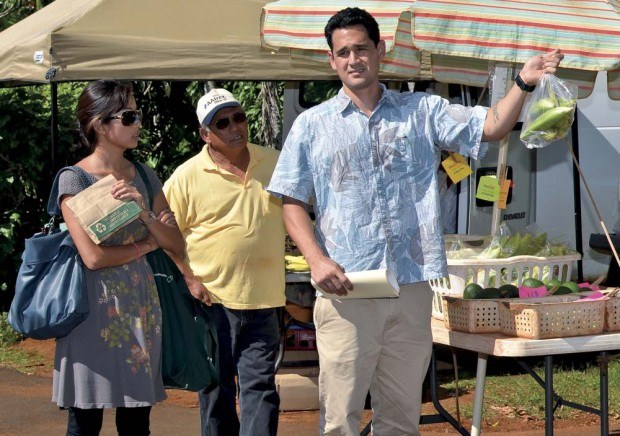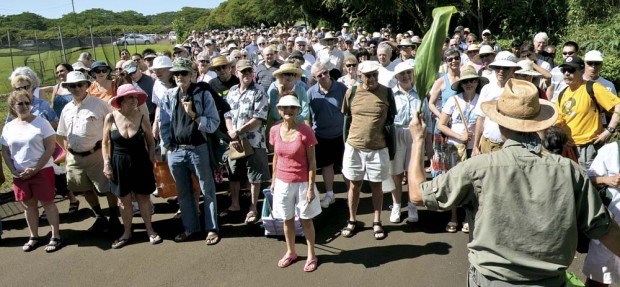KOLOA — Shoppers visiting the county Sunshine Markets should bring their own bags to tote purchases, county officials said. County attorney Mauna Kea Trask and Emily Ishida of the county Solid Waste Division were on hand Monday at the Koloa
KOLOA — Shoppers visiting the county Sunshine Markets should bring their own bags to tote purchases, county officials said.
County attorney Mauna Kea Trask and Emily Ishida of the county Solid Waste Division were on hand Monday at the Koloa market to clarify the recently enacted law relating to plastic bag reduction on Kaua‘i.
Trask said farmers market vendors are not exempted from the ordinance.
“You sell outdoors, you use umbrellas, but you are each considered a vendor,” he said.
Branch Harmony, the site leader for the Koloa Sunshine Market, added the plastic bag ordinance verbiage to the welcoming spiel he makes to the throng of shoppers patiently waiting for the noon start of the market.
Harmony encouraged shoppers to get bags from their cars, or having none, perhaps share with neighbors for those who don’t have bags to tote their purchases.
The purpose of the plastic bag reduction law is to encourage customers to bring their own reusable bags when shopping, the ordinance states.
Steeped in the environment and sustainability, the production and use of plastic checkout bags have significant impacts on the environment, including, but not limited to: contributing to unsightly litter; creating an additional burden on the landfill; contributing to potential death of marine animals through ingestion and entanglement; and requiring the use of millions of barrels of crude oil for its manufacture, Trask read from the ordinance.
Trask and Ishida were invited to stay and watch the activity when the market opened, getting a better idea of what vendors encounter.
“There was a lot of confusion when the ordinance took effect,” Harmony said. “Some said the Sunshine Market was exempt, but we just got the copies delivered by Terry Phillips, the Sunshine Market monitor, and it affects us.”
Almost two weeks after the ordinance took effect, most the vendors were already holding back on plastic bags, although many started prepacking items for shoppers.
Vendors also needed to fill out forms, distributed by Phillips, stating the origins of the produce.
“Pre-packaging is okay,” Trask said. “But putting the packages into checkout plastic bags is not.”
There were several inquiries into specific types of bags, but Trask assured the vendors there would be a transition period in which they would be working with them as concerns were raised.
“The vendors are really stressed right now,” Phillips said. “Not only are they coming from bad weather that ruined a lot of their crops, they have to contend with this new law.”
A vendor said a customer who used to bring plastic checkout bags for her to use at the market was exasperated when she was told the vendors couldn’t use the bags anymore.
“What am I going to do with all my plastic bags?” the vendor said. “The law was designed to keep them out of the landfill, so initially, the county should have designed a take-back period where people could bring their unneeded plastic bags. Now, it’s just going to end up in the landfill.”
Vendors were visibly frustrated with trying to cope with the new law, and in an effort to comply, had more offerings of pre-packaged produce, reducing choices for some shoppers who wanted just one tangelo or one naval orange.
“Every time they pass a law, we lose a right,” said another vendor.
The Kaua‘i County Council passed the law in October 2009. The county held a series of public-information meetings last November to educate community members about the new ordinance.
Visit www.kauai.gov for a copy of the plastic bag reduction ordinance.



